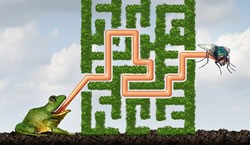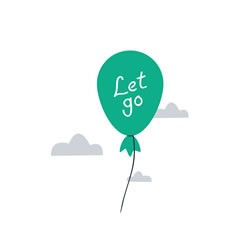Release Your Limiting Beliefs for Bigger Success in Freelance Writing

This is from a series originally posted for PWA in 2017 and has been edited/updated.
 Recently, I enjoyed a conversation with one of your fellow professional writers.
Recently, I enjoyed a conversation with one of your fellow professional writers.
She was stuck.
Or at least she believed she was stuck — which is why she was stuck.
Fortunately, I did not buy into her beliefs about why she believed she was stuck.
So, we had a conversation around her limiting beliefs.
A few weeks after our call together, she wrote me to let me know she was writing again — and loving it. She even wrote a blog post where she said, “After an hour with Sean (by phone), I’ve been able to adjust my thinking in ways that have helped me behave differently and more productively.”
I love that her behavior changed. That’s what happens when you identify and let go of limiting beliefs.
After all, information without implementation leads to devastation.
You might be wondering what I shared with her in that hour on the phone, yeah?
How did that single conversation set her free to get into action and create a new future?
In essence, I helped her see, and let go of, her limiting beliefs that blocked her from achieving success in freelance writing.
And that’s what I want to help you do here.
You see, if you have limiting beliefs, you often don’t realize it until someone points those limiting beliefs out.
Why? Because to you they are simply beliefs, not limiting beliefs… they’re just the way things are.
That’s why, I’m sharing with you:
- 5 ways limiting beliefs hold you back from being all you were created to be
- Where limiting beliefs start
- How to identify your limiting beliefs
- How to let go of your limiting beliefs
If you let it, this blog post can change your life.
By the way, my name is Sean McCool. I’m an AWAI-trained professional copywriter, master life coach, and founder of the personal development company, Rise Up Champion.
In 2008, I finally let go of my limiting beliefs and went from struggling handyman to award-winning copywriter in about 120 days. Since then, I’ve done very well as a copywriter. I daily use those skills in my coaching and personal development businesses.
But enough about me. Let’s move YOU from wherever you are right now to where you want to be in the future.
Ready to find, and let go of, those pesky limiting beliefs holding you back?
Ready to start living the life you know you’re meant for, but can’t seem to quite make happen?
If so, let’s start.
What is a limiting belief and why does it matter to your success in freelance writing?
In short, limiting beliefs have more of a negative impact on your life than any other factor.
After all, most of us are pretty rational — we're not going to spend a lot of time on something that we believe is doomed to fail. Why would you even try to lose weight if you genuinely believed that everyone in your family was destined to be overweight? You wouldn’t.
We all carry around numerous limiting beliefs. They come from a variety of sources, as well as from the way we see the world around us. Humans can't help but learn, but sometimes we learn things that aren’t quite the way we think they are.
These beliefs were often something we “caught” in our environment more than something we were taught. These beliefs are subtle, but powerful.
Fortunately, you can let go of limiting beliefs and replace them with beliefs that empower you.
Imagine replacing a limiting belief with one that makes life easier and enables you to be more successful. How would you feel? How would you act? What would you have? Who would you be?
If you want to do more than imagine, then you need to realize it's important to follow a plan or process.
Why?
Because most things in life are like baking a cake. If you do all the right things in the right order, in the end you'll get a cake. It's impossible to have any other result. Likewise, by following a process, you can learn to let go of your limiting beliefs.
Processes can be a wonderful thing. For example, if you have an effective process for getting up and getting ready in the morning, you'll never be late.
If you have a healthy process for deciding what to eat, you're likely pretty healthy.
So, let’s go through a process to identify and let go of your limiting beliefs.
First, we need to ask the question:
What is a limiting belief?
A limiting belief is one that causes life to be less than completely satisfying.
You might believe that you can't be a doctor, but if you have no interest in becoming a doctor, what's the harm? There's no point in dealing with a belief like that, because letting go of it isn't going to have a positive impact on your life.
Focus your energy where it can have the greatest impact.
The belief that you can't be a doctor is not a limiting belief based on our definition. So, limiting beliefs are those beliefs that stop you from having, being, or doing what you want to have, be, or do.
Consider this…
If all of your beliefs were 100% accurate, you would be able to have, be, or do nearly anything you've ever really wanted.
And, anything you now do… anything you now have… and anything you believe yourself to be right now is the result of what you’ve believed in the past.
Believing the right things has a huge impact on your level of success.
5 Ways Limiting Beliefs Hold You Back
 Limiting beliefs have a profound impact on our lives. By the end of this post, you’ll see just how pervasive they really are.
Limiting beliefs have a profound impact on our lives. By the end of this post, you’ll see just how pervasive they really are.
They affect our lives in so many ways, and none of them are good.
If you can let go of the limiting beliefs you possess, your life would forever change for the better.
Before we get to letting go, let’s take a look at five ways limiting beliefs are holding you back right now:
#1 — Limiting Beliefs Sabotage the Proven Process of Success in Freelance Writing.
One of the main ways that limiting beliefs hold us back is they short-circuit the success process.
What is the success process?
Well, there are entire books and courses written on the subject. And since that’s not what this article is about, let me share the abbreviated version. This is what I’ve discovered works in my life and when working with others. In short, the success process can be boiled down to four proven steps:
Success Process Step #1: Decide what you want.
Success Process Step #2: Do something to make it happen.
Success Process Step #3: Adjust your approach based on feedback.
Success Process Step #4: Keep going until you are successful.
So the question is: How do limiting beliefs sabotage this process?
Well, if you have a limiting belief, you might stumble on Step #2. As I mentioned earlier, most people won't take an action they think is doomed to fail. We think to ourselves: “Why bother?” Well, this is exactly how limiting beliefs sabotage us — they stop us before we ever get started.
Another problem that shows up is that people are unable to complete Step #4.
Most of us decide too quickly that something won't work. As soon as you believe it won't work, you're unlikely to continue trying.
Have you ever looked at the list of writers who are now huge successes, but couldn’t get anyone to take them seriously in the beginning? It’s a who’s who of writers.
How many times will your current beliefs stand up to rejection?
Achieving big things usually requires time and effort. Frequently, that effort needs to be an intelligent and calculated effort, as opposed to the lower-your-head-and-plow-ahead type of effort. It takes time and experience to put forth the proper effort. You simply can't do this with a limiting belief in the way.
Besides sabotaging the success process, limiting beliefs hold you back in other ways too, such as:
#2 — Limiting Beliefs Taint Your Experience of Living.
You will do fewer things over the course of your life when you’re constricted by your limiting beliefs.
For instance, if you believe roller coasters are dangerous, then you wouldn’t ride them, and you’d miss out on the thrill so many others experience. You also limit serendipity in your life. And for writers, serendipity holds immense insight, inspiration, and opportunity.
Imagine what your life would be like without any limiting beliefs. Surely a fuller, richer life is more appealing to you, yes?
No matter how great your life is right now, you are holding on to beliefs that stop you from experiencing the fullness of life. We all are.
#3 — Limiting Beliefs Can Cause You to Unintentionally Harm Those Around You.
Beliefs are more like a virus and less like math because beliefs are caught more than they are taught.
Even with the best of intentions, you infect others with your limiting beliefs, and those beliefs then affect them the rest of their lives.
Who are you infecting, and how is that affecting them and their potential to live their best life?
#4 — Limiting Beliefs Hold You Back from Growing Fully as a Human Being.
It can be useful to view life as a training ground where the purpose is to:
- let go of your limiting beliefs,
- experience the world in a way that appeals to you, and
- serve others from place of power and certainty — not fear and uncertainty.
If you could do those three things, what kind of life would you have lived over the course of your lifetime?
What path are you on right now?
Where are you holding yourself back?
Where are your beliefs keeping others from experiencing your gifts?
Later in this article, I’ll show you how to systematically answer these questions.
#5 — Limiting Beliefs Make You Inefficient.
Limiting beliefs cause us to find an alternate path, if we look for one at all. If we don't believe the best route will work for us, we spend a lot of time following a less direct path in an effort to work around our limiting belief.
For me, I’ve known since high school I wanted to be a writer, and I wanted to teach people. At the time, I didn’t know about copywriting or life coaching, but I didn’t really believe I could make a living as a writer or teacher. So I did everything but those things.
Why? Because I had limiting beliefs around those careers. Unfortunately, there was no one in my life at the time to help me challenge my beliefs.
Save yourself some time and deal this week with the limiting beliefs holding you back, instead of waiting or giving up on what you know you really want.
Now, let’s dive a bit deeper into where these limiting beliefs that infect your thinking come from in the first place.
Where Limiting Beliefs Start
 Limiting beliefs are pervasive in our lives. You probably are aware of many of them, but many sneak into your thinking patterns.
Limiting beliefs are pervasive in our lives. You probably are aware of many of them, but many sneak into your thinking patterns.
Limiting beliefs come from a variety of sources. Some of these sources might surprise you. Many of these sources actually were trying to help us, so don't blame them. They simply believed the wrong things, too.
Here are a few:
#1 — Limiting Beliefs Start with Your Family.
Most of our family means well, but many of our limiting beliefs come from familial sources, and our suggestibility to comments from our families can vary. Maybe your mom told you that you couldn't run track in high school because you were too heavy, so now you believe you could never be a runner.
Maybe your dad said that no one in his family ever went to college, so you believe it's not a possibility for you. Maybe you grew up in a lifestyle that was economically challenged, so you decided that being wealthy was impossible for you.
#2 — Limiting Beliefs Start with Your Friends.
Much like our families, friends can do and say things that lead us to believe we're less capable than we are. Keep in mind that many of our “friends” don't want to see others do a lot better than they themselves are doing.
Also, other people tend to unintentionally push their limiting beliefs on others.
#3 — Limiting Beliefs Start with Your Teachers.
Teachers can have a lot of influence over us. When we're younger, they're almost like parents. Most children spend six to eight hours per day for 12 years with their teachers. Teachers are people, too. Some of them have their stuff together, some do not.
#4 — Limiting Beliefs Start with Your Experiences.
In many ways, this is probably the only real source of our limiting beliefs.
For instance, it's not really what your parents said to you, it's your interpretation of what was said to you.
For example, if your parents said, "You'll never be able to get into college," you could believe that what they said is true, or you could believe, "They don't know what they're talking about. I can do it if I want to do it."
#5 — Limiting Beliefs Start with Everything Else.
Other people, books, the Internet, the news, movies, and more all have the opportunity to give us pause and doubt. Consider all the sources of information and opinion in your life. They all have the opportunity to steer you in the wrong direction.
As you can see, you can’t completely escape from being infected and affected by limiting beliefs.
So is it pointless to try to be all we were created to be? No! You simply must understand how to use the right tools at the right time to create the life you want.
You must learn to systematically uncover your limiting beliefs and then let go of them.
How to Identify Your Limiting Beliefs
 You cannot manage what you do not recognize.
You cannot manage what you do not recognize.
If your car is low on gas, there’s nothing you can do about it unless you look at the gas gauge and recognize it is low. Once you recognize you are low on gas, you can begin to take action to solve the problem.
The first step in solving any problem is recognizing there is a problem.
Are you ready to uncover your limiting beliefs?
The following four-step process is a tool that allows you to identify the most relevant limiting beliefs based on what you want to create in your life. When you get these indicators right, letting go of the beliefs becomes pretty straightforward.
Step #1 — Identify Areas of Life Where You Feel Challenged.
Make a list of the areas in your life where you feel challenged. If you have an area of your life that displeases you, and you're not actively doing something to fix it, then it's a pretty good bet that you have a limiting belief.
Otherwise, doesn't it make sense that you'd already be doing something to change the situation? Your behavior is an indicator of your beliefs.
Here are some areas to consider using the FIRE framework I use with my coaching clients (FIRE is an acronym for the four major areas of life — Fitness, Identity, Relationships, and Enterprises):
FITNESS — Are you taking good care of yourself? How is your weight? Do you go to the doctor regularly for checkups? Are you eating right? Are you giving your body the best chance to take care of every other area of your life?
IDENTITY — Are you comfortable in who you are, why you are here, and where you are going? If you’re not clear on who you are and who you want to become, any result will be both enough and a disappointment at the same time.
It’s never been said quite as well as Lewis Carroll said it in Alice’s Adventures in Wonderland:
"Would you tell me, please, which way I ought to go from here?"
"That depends a good deal on where you want to get to," said the Cat.
"I don't much care where —" said Alice.
"Then it doesn't matter which way you go," said the Cat.
"— so long as I get SOMEWHERE," Alice added as an explanation.
"Oh, you're sure to do that," said the Cat, "if you only walk long enough."
True. Are you doing the things you really want to do? Do you dream of going to Europe, but haven't been? Do you want to learn to play the piano, but never have? In short, are you becoming who you want to become?
RELATIONSHIPS — Are your relationships satisfying? Consider your intimate relationship as well as your relationships with your family, friends, and coworkers. What’s working? What’s not working? What’s missing? What’s next?
ENTERPRISES — This isn’t just work, but anything you are up to and responsible for. You might have several kinds of enterprises going at once, such as managing a household, a career, a volunteer organization, etc. Which ones are struggling? Which ones feel plateaued? Where does it feel like you are stuck or spinning your wheels?
Write it all down. Don’t try to figure it all out. Just get the challenges down on paper or on your computer.
Step #2 — Identify the Beliefs Contributing to the Challenges.
This is where the real work begins. This is where real, radical honesty with yourself needs to happen. Try to step outside of yourself and look objectively at your challenges.
Then, make a list of all your beliefs, good and bad, based on the challenges you identified above. Don't attempt to filter them as positive or negative while doing this process; just get them all listed as you brainstorm. You will examine them later.
Here’s how the limiting beliefs around money might look:
- Making over $100K a year is really hard.
- I'll never be wealthy.
- Rich people are dishonest.
- I'll never have enough money to have a nice house.
- If I'm rich, people will try to steal from me.
- My friends will treat me differently if I have a lot of money.
- No one in my family ever earned more than X
- Clients in my niche won’t pay me enough to earn well.
List whatever comes to mind. We’ll deal with them once you have listed them.
Can you see why it would be difficult to earn a lot of money if you believed these things?
As an example, I had one client who couldn’t break through as a copywriter. He tried, but never quite cracked the six-figure mark. During a coaching session, I asked him what his dad did for a living. He said construction. I asked him what his dad thought about office workers. He said that his dad considered those “pencil pushers” overpaid.
As a copywriter, my client was the definition of a pencil pusher. So because he wanted to be loved by his dad, he had to make sure he was not being “overpaid.”
See how that works?
Moving on…
Step #3 — Identify the Beliefs that Are Holding You Back.
Think about which beliefs are having the greatest negative impact on your life.
One of the most powerful and effective ways to do this is to consider how your behavior would change if that belief were eliminated from your life.
Just ask yourself, “What would I have, what would I do, and who would I be without that belief?”
Don’t just guess which beliefs are the most damaging. Really examine it and consider the change that your life would experience if you weren't held back by that belief.
Step #4 — Prioritize the Beliefs in Preparation for the Letting-Go Process.
Start with the limiting belief that you feel is creating the most challenge in your life. Put them all in order from the belief having the greatest negative impact to the least. It makes sense to spend your time where it's going to do the most good. Prioritizing your time is always a valuable strategy.
Now that you have a list of your limiting beliefs and have them in order, it's time to start dealing with them.
How to Let Go of Your Limiting Beliefs
 You are now ready to benefit from one of the most powerful letting-go processes I’ve ever discovered.
You are now ready to benefit from one of the most powerful letting-go processes I’ve ever discovered.
If you’re ready, follow this seven-step process to banish a limiting belief:
Step #1 — Question the belief.
Ask yourself the following three questions:
- Do I really know that this is true?
- Have I experienced this myself enough times to be confident it is true? (Remember: You can't accurately draw conclusions from a limited number of experiences.)
- Do I really know that this belief is true, without a shred of doubt?
These are powerful questions when answered honestly. Do not underestimate or skip this step. It is vital to your ability to create a new life without limits.
Step #2 — Dig Deeper.
Where did you come up with this belief?
For example, did your limiting belief about money come from your mom? Was your mom a wealthy person? If she wasn't at that time, then she's not a reliable source of information. After all, an expert on money would be able to have a lot of it.
If someone hasn't had a lot of money, then they don't really know how to accumulate it or what it means to have it. Consider whether or not the source of your belief is a valid source.
Your beliefs should come from your own personal experiences and from the advice of experts. That's it. If your dad wasn't a great college student, you can find a better source of information about what it takes to be successful in college. You should consider suspect any other source of information.
Rely on experts. They are easy to find with a little research. After all, there's no reason to take stock tips from a homeless person.
Step #3 — Dethrone the Old Belief.
Simply state to yourself, "I choose not to believe this anymore. It's not true."
It might sound trite, but stating your intention has a profound effect.
Look for supporting evidence. Find some reasons and examples why this limiting belief is false. For example:
The person who told me this doesn’t really know.
I've never actually tried it for myself.
I've seen others who are less capable than me be successful at this.
At the very least, you should feel a sense of doubt about that limiting belief. If you don't, then keep coming up with more reasons. Get online and read some articles by someone you truly feel is an expert on the topic of your belief. Search for examples that the belief is false.
Now imagine, vividly and in writing, how much your life would change if you didn't have this belief in your life.
For instance, you could write a story or journal entry in present tense of today as if you never had that old belief.
Step #4 — Create a New Belief that Serves You.
This will be the opposite of the limiting belief, or at least something along those lines. Create a belief that will improve your life and support your ability to take action to make your life better.
Find examples to support this new belief. Any belief will be more stable if it has supporting information and evidence.
Research. Really try to prove that it's true. Imagine that you had to prove to someone else that your new belief is accurate. That should get you where you need to be.
Step #5 — Measure Yourself.
Each day, check yourself. How do you feel about your new belief? How do you feel about your old belief? Check your gut; it's a direct link to your subconscious.
Is your behavior changing?
If your beliefs change, the way you act and/or feel will change, too. Our lives and feelings are a manifestation of our beliefs. If your beliefs really have changed, your life will change as well.
Step #6 — Repeat.
Go back to your list of limiting beliefs. Keep working on your list of negative beliefs. Work through those items and continue to add new items to it.
You'll find that you'll discover new limiting beliefs as you start making progress on the old limiting beliefs.
As you experience new things, new limiting beliefs will show up. These are beliefs you didn't know you had until this point.
As you set new goals, new challenges will present themselves. As you learn and experience more, your objectives change, so the limiting beliefs you have will change, too.
For instance, maybe you’ll decide 10 years from now that you want to be a doctor; any limiting beliefs you have about being a doctor would then have to be addressed.
For me, it was to go from broke with $26 in my pocket to handyman. Then from handyman to copywriter. Then from copywriter to life coach and business owner.
In other words, this is a continual process. The better you get at it, the faster you can change or advance your life in the direction of your dreams.
Step #7 — Repeat the Repeat.
Continue examining your life for limiting beliefs and eliminate them. It’s like pulling weeds. No matter what you do, some weeds always pop up over time. Simply recognize them and get rid of them.
Repeat all the steps on a regular basis. As you set new goals or have new challenges in your life, repeat the process. It would be a great idea to sit down once a week and make a new list of limiting beliefs. You would be unstoppable.
So what? Why does all this matter, and is it worth the effort?
Yes, because limiting beliefs really do put our lives in a stranglehold. They can lead us to believe we have limited options to deal with our challenges, or that we’re limited in doing new things.
These beliefs have profound negative consequences and letting go of them is one of the best things we can do for ourselves.
Our limiting beliefs come from a variety of sources: friends, family, teachers, neighbors, the media, and our own interpretation of the world and the events in our lives. In many cases, the source of the limiting belief truly had our best interests at heart. The people around us have a significant impact on us.
By examining those beliefs and asking ourselves some key questions, we can systematically let go of them. Unless we've experienced something numerous times, or we have the advice of an expert, we don't really have the knowledge to make accurate judgments about something. Be selective about whom you believe.
Installing a new empowering belief is similar to installing a limiting belief, except that the process has intention behind it. A new belief needs evidence to support it before it can be believed.
A new belief will leave clues in the form of new behaviors and different results.
Measuring yourself and your life is important. This measurement process is critical, both to see if the new belief is in place and if it is indeed an empowering belief.
By systematically going through all of your limiting beliefs, it’s possible to dramatically improve your life. Always remember that new limiting beliefs will occur over time, and it's important to check yourself for these new limiting beliefs.
Life can be relatively easy and simple. Deal with your mental obstacles, and you'll see those are the biggest obstacles you have.
Look at your limiting beliefs today — your life will never be the same!
